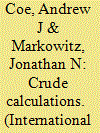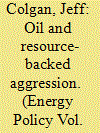| Srl | Item |
| 1 |
ID:
181669


|
|
|
|
|
| Summary/Abstract |
For many centuries, conquest was commonplace, and its attractiveness was central to the character of international politics. Why has it declined? Existing theories cannot explain why powerful countries no longer conquer states with easily extractable wealth. We develop an explanation based on the relationship between a potential conqueror's economic productivity and its ability to profit from conquest. Productivity has opposing effects on conquest's profitability: it raises the opportunity cost of each asset diverted to conquest, but also reduces the quantity of assets required for conquest. The net effect is determined by the composition of investment in innovation. We document that since at least 1950 investment has been predominantly aimed at civilian, not military innovations, so that rising productivity should reduce conquest's net profitability. Using cost analyses of comparable wars, we estimate bounds on the profitability of conquering the oil and gas reserves of the Persian Gulf, a very tempting target, for the United States and Iraq, two potential conquerors of widely differing productivity. Though both mechanisms operate, we find that the net effect of higher productivity is to reduce the profits from conquest. Moreover, this net effect is large enough to render conquest generally unprofitable for contemporary high-productivity states.
|
|
|
|
|
|
|
|
|
|
|
|
|
|
|
|
| 2 |
ID:
103467


|
|
|
|
|
| Publication |
2011.
|
| Summary/Abstract |
A common misperception about oil politics is that it has a uniform, monolithic effect on policy development. This paper argues that in fact the net political effect of oil varies dramatically depending on the nature of the petrostate. It shows that oil income, when combined with revolutionary governments in petrostates, generates strong incentives for foreign policy aggression and international conflict. The aggressiveness of petro-revolutionary states is shown to have consequences in both military and economic spheres of international relations. Militarily, the aggressiveness of this type of state leads to a high rate of armed conflicts. Economically, the aggressiveness of petro-revolutionary states shapes global oil markets and international economic relations. The argument is tested using statistical analysis of international conflicts and economic sanctions. The policy implications are then considered, focusing on the negative global impacts of dependence on oil consumption.
|
|
|
|
|
|
|
|
|
|
|
|
|
|
|
|